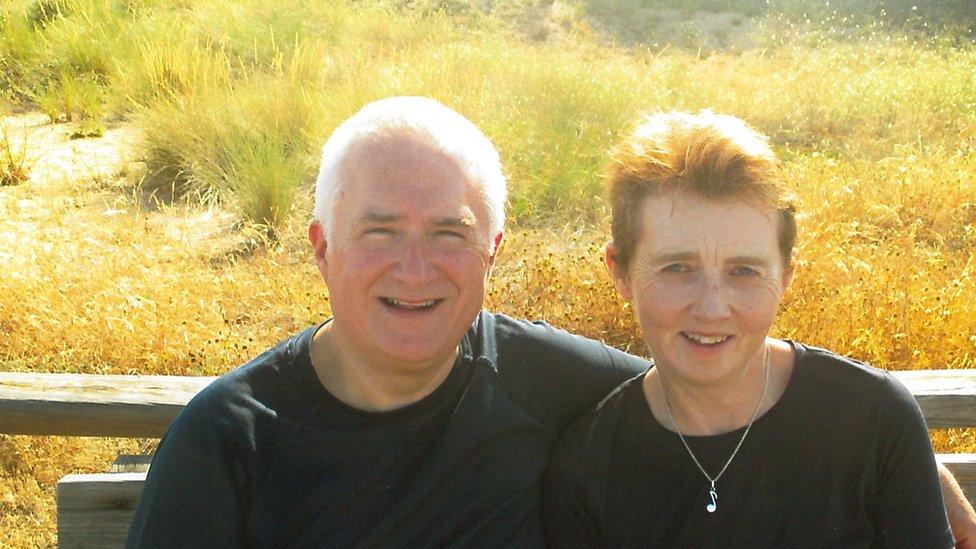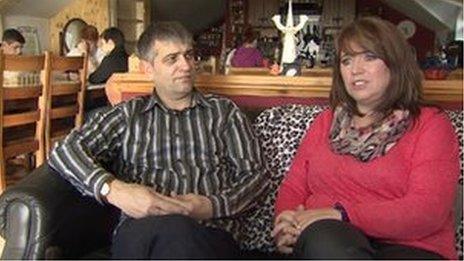Adoption in NI: Families welcome new laws to provide support
- Published

Wesley and Muriel Graham adopted their son in 2007 and found there was little post-adoption support
Wesley and Muriel Graham began their journey to adopt a child almost two decades ago.
Unable to conceive naturally, the County Down couple decided to start the adoption process in 2004.
Two years later, they were granted a foster placement for a six-year-old boy and adopted him in 2007.
But the Grahams say they did not realise how little post-adoption support there was in Northern Ireland then, due to outdated legislation.
Health Minister Robin Swann is set to introduce legislation next month to modernise the current laws, which are more than 30 years old, external.
Mr Graham said when he and his wife became adoptive parents, there was "no post-adoption support worth speaking about" in Northern Ireland.
'There was no help available'
Instead, he said, they were mostly left to their own devices in managing their son who had come to them with a "lot of emotional baggage", because of trauma he had experienced early in life.
"He would have meltdowns and we used to stand at the bottom of the stairs and just watch the contents of his room come over the bannisters," Mr Graham told BBC News NI.
Northern Ireland's adoption law is to be updated to make the process easier and faster.
"I remember one time ringing the health trust we'd adopted him from and asking for help, and there was no help available. The social worker just said: 'Do you want us to come and lift him?'
"I was so shocked and I thought there's no way we're giving up our son, after the amount of effort we've put in to have him."
Since then the level of support across health trusts in Northern Ireland has improved, but adoption laws still lag behind the rest of the UK.

What will the new laws do?
Reform Northern Ireland's legal framework for adoption
Introduce a legal duty so adopters can access more support through social services
Ensure post-adoption assessments to consider a child's needs
Enable courts to impose timescales for adoption proceedings

It is estimated that there are more than 700 adoptive families in Northern Ireland. In the year to March 2020, 111 children were adopted from care.
On average, it takes more than three years, external for a child to be adopted from care in Northern Ireland, but it can vary greatly depending on a child's individual circumstance.
EJ Havlin, the director of Adoption NI, described the new laws as a "long-awaited opportunity".
"There are children who are harder to place than others - they tend to be in sibling groups or older children - so if you live in an area where it is harder to get adoption support, currently it means those children can be discriminated against," she said.
"It also puts some people off if it feels like a challenge they don't feel equipped to meet, but these laws will change all of that."
The health minister said he wanted to "remove unnecessary delay and uncertainty" and make it possible for more people to consider adoption.
The bill is intended to become law before May although it will take some time before it becomes operational.
Adopting 'has been a privilege'
Mr Graham said while more provision has become available since he and his wife adopted their son, having new laws in place sooner would have "made a vast amount of difference" to their family during those early years together.
He said he hoped the legislation will help anyone in Northern Ireland who chooses to adopt, and more importantly those children who are adopted.
"It's really worked out well despite the fact that the first few years were really fraught and all that was as a result of his early childhood, that does leave a mark," he added.
"It's that this new bill will address in terms of providing the support adopted children will need to thrive."
Mr Graham speaks proudly of his son, who is now studying at university and also plays the clarinet and saxophone.
"A lot of people say to us that we're doing a wonderful thing, but I say we're the lucky ones because it's just been such a privilege to bring him up.
"To see him grow was so rewarding for us both - we are the lucky ones by far."
Related topics
- Published15 October 2018

- Published5 November 2013
